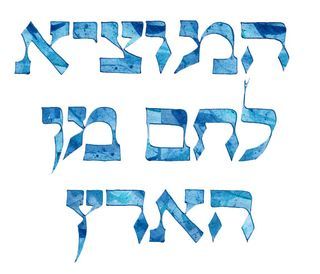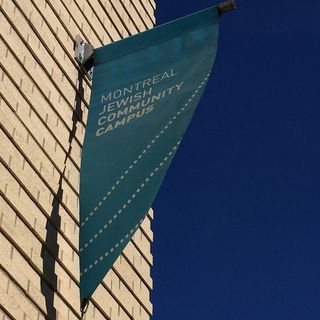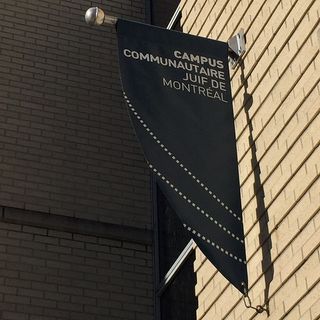Rachel Barenblat's Blog, page 108
March 17, 2016
In three weeks: a Shabbaton in Las Vegas
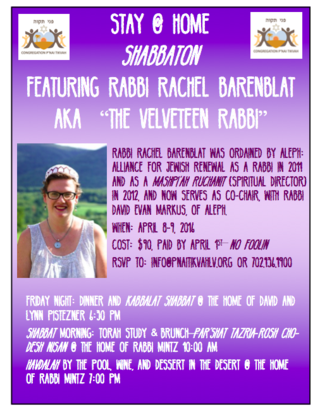 Over the weekend of April 8-9 -- three weeks from this coming weekend -- I'll be the scholar-in-residence for a Shabbaton (a Shabbat retreat) hosted by Congregation P'nei Tikvah in Las Vegas, Nevada.
Over the weekend of April 8-9 -- three weeks from this coming weekend -- I'll be the scholar-in-residence for a Shabbaton (a Shabbat retreat) hosted by Congregation P'nei Tikvah in Las Vegas, Nevada.
The weekend will feature a Friday night dinner as our kabbalat Shabbat experience; a Shabbat morning Torah study and brunch; and a Saturday evening poolside havdalah and dessert gathering -- complete with poetry reading!
I'm looking forward to meeting members of the P'nei Tikvah community, and to spending time with my host there, Rabbi Yocheved Mintz, who I have known for many years through OHALAH, the association of Jewish Renewal clergy.
This isn't officially part of the ALEPH / Jewish Renewal Listening Tour, but on Shabbat afternoon there will be some conversations about Jewish Renewal's past, present, and future even so.
If you are in or near Las Vegas, I hope you'll consider joining us for the Shabbaton! The organizers are asking people to sign up (and pay) by April 1, so -- please let them know if you're planning to join us.
(From Las Vegas I will be moving on to the California stops on the ALEPH / Jewish Renewal Listening Tour, so if you're in southern or northern California, stay tuned for more information there.)

March 16, 2016
Collaboration with God: on Torah and bread
If you pay attention to the emails you receive from the synagogue office, you may have noticed that this month some of us are engaging in an experiment with the mitzvah of blessing our food. We're making an extra effort, during this lunar month of Adar 2, to remember to say a blessing over the foods we eat. At the end of the month, we'll take stock of how the experiment felt. We'll examine whether, and how, practicing this mitzvah of expressing gratitude for our food may have helped us to flourish as human beings.
One of the core blessings over food is the blessing we'll recite over our challah when this morning's service is complete: the hamotzi.
At first blush it appears to be pretty similar to all of the other food blessings, right? We bless God Who creates the fruit of the vine, the fruit of the tree, the fruit of the earth. The hamotzi is just like those. Isn't it? Well -- not quite. We say borei pri hagafen over wine or grape juice or grapes. We say borei pri ha-etz over apple juice or over apples. But the hamotzi doesn't thank God for the grain of the field. The hamotzi blesses God Who brings forth bread from the earth.
Bread does not grow on wheat stalks. Bread requires human effort. God causes the grain to grow, but in order for there to be bread someone has to harvest the grain, mill the grain into flour, mix it with water and a leavening agent, shape it, proof it, and bake it. Without God, we wouldn't have the grain -- but without human beings, the grain couldn't become bread. God may indeed bring forth bread from the earth, as the poetic language of our blessing teaches, but the means through which God does that work is human hands.
Human hands are needed to turn wheat into bread... just as human hearts and minds are needed for the transformation of Torah into its most meaningful form. Sixteenth-century Rabbi Judah Loew, known as the Maharal of Prague, wrote, "Consider all of God's creations, and you will see that they are all in need of some finishing act. Wheat must be processed in order to be fit for human consumption; it was not created by God in finished form... [and just so], Sages finish and complete the Torah."
"The Torah of Adonai is perfect, restoring the soul," says the psalmist. But if the Torah is perfect, how can it need to be completed? Maybe the problem lies in what we think perfection means. Look out our beautiful sanctuary windows at the sky. Would you say that the sky right now is perfect? I would. Or at least, I aspire to be someone who can always see perfection in the sky. It's perfect whether it's blue or grey, clear or cloudy. It's perfect, and when it changes into something new, it will be perfect then too. Perfect doesn't have to mean unchanging. Perfection can lie in the very continuity of change.
And perfect doesn't have to mean finished. Maybe what makes Torah most perfect is precisely that it's not finished... until we read it and add our voices to the tapestry of interpretation. Maybe Torah in a vacuum isn't perfect. Maybe Torah becomes perfect precisely when we commit ourselves to engaging with it, to spinning its fibers into beautiful tapestries, to grinding and mixing and baking its grain into nourishing bread. Torah is the raw material given to us by God, the grain of the field awaiting our contributions of effort and heart. Our task is to engage with those materials and make them into something new.
This week we enter into the book of Vayikra, "And God Called" -- known in English as Leviticus. This section of Torah is filled with the details of the ancient sacrificial system. It details the offerings our ancestors made before God: offerings in search of atonement or forgiveness, offerings of gratitude, wholeness offerings, elevation offerings. It describes the offering-up of bulls and goats, sheep and pigeons, elaborate breads and dishes of oil and flour. For many moderns, these are the most challenging portions in Torah from which to wrest meaning. Who among us can imagine communicating with God through the ritual slaughter of cattle and pigeons, or the burning of incense and fine meal?
The word for the service the priests offered in the temple is avodah, from a root meaning "to serve."(The same idea is embedded in our English word for what we've come here for this morning: "services.") Today we seek to engage in avodah she-ba-lev, the "service of the heart" a.k.a. prayer. The sacrificial system worked for us two thousand years ago... and then when our circumstances changed, we found a new way to understand the meaning of avodah. Who knows how we'll connect with God in another two thousand years? The only thing I hope I can say with certainty is that we will still be wrestling with the question. We will still be figuring out how to transform the raw stuff of Torah into bread that gives us the spiritual nourishment we need.
What happens if we approach these descriptions of ancient sacrifice in the spirit of collaborative inquiry, bringing to bear on this Torah the leavening of our curiosity and the heat of our impassioned hearts?
This is the d'var Torah I offered yesterday at my shul.

Vancouver-bound
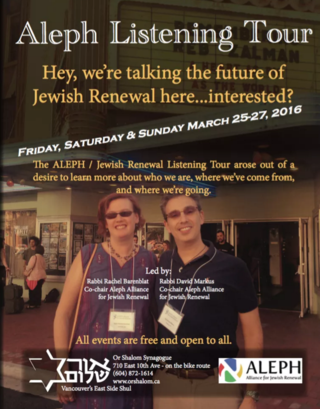 We're on the road again! The next stop on the ALEPH / Jewish Renewal Listening Tour is the one for which we'll be traveling the furthest: Vancouver, British Columbia.
We're on the road again! The next stop on the ALEPH / Jewish Renewal Listening Tour is the one for which we'll be traveling the furthest: Vancouver, British Columbia.
Our weekend in Vancouver will be hosted by Or Shalom, Canada's Jewish Renewal community of longest standing. As their history page on their website notes, they began in 1982 as a havurah, a group of friends meeting in people's homes. Or Shalom's first rabbinic leadership came from Rabbi Daniel and Hanna Tiferet Siegel, with whom I studied (halakha and spiritual direction, respectively) in rabbinic school.
More recently the congregation was led by Rabbi Laura Duhan Kaplan, another dear rabbinic school teacher and friend. Today it is led by Rabbi Hannah Dresner, yet another dear friend from rabbinic school! I am delighted that all of these luminaries will be joining us for the weekend. This will be Reb Hanna's second stop on our Listening Tour, as she was with us in Boston last fall when we enjoyed beautiful morning davenen and our first open mike session at B'nai Or in Boston.
As has become our custom, the Vancouver weekend will be chock-full of a variety of different kinds of encounters. We'll have opportunities to daven with the Or Shalom community (and we'll participate in leading the davenen, too.) We'll hold open mike sessions, offering members of the community the opportunity to share their stories, remembrances, frustrations, hopes, fears, and dreams. We'll meet with congregational leadership and with young people. We'll talk about big-picture questions of the ecosystem of innovation, and smaller-picture questions of what Or Shalom and Jewish Renewal in British Columbia need from ALEPH and what ALEPH needs from Or Shalom and from Jewish Renewal in BC in return.
I imagine that some of our conversations in Vancouver will be parallel to the conversations we had in Montréal about the unique valances of Jewish Renewal in Canada. I imagine that some of our conversations will be unique to this place and this constellation of participants. And I imagine that some of our conversations will echo conversations we've had in other cities -- and also with other communities via videoconference when our lives, finances, and "day jobs" haven't permitted us to visit in person. (If you are in a place which is not on our itinerary, and would like to speak with us about your hopes and dreams for the future of ALEPH and Jewish Renewal, email chair@aleph.org and we'll do our best to set up a videoconference!)
I know that our time in Vancouver will be too brief to adequately have all of the conversations we want and need to have. (And don't even ask me whether we're going to do any sightseeing. We're flying out today, and back via a redeye on Sunday night; this is the very definition of "short and sweet.") Our mantra has become "to be continued," because every conversation is inevitably only part of the story, and there is always more that we can learn. But even though it won't be "enough" time, I know it's going to be delightful. We can't wait to daven, listen, and learn at Or Shalom this weekend. To our hevre (friends) in Vancouver, we look forward to seeing you soon! And to everyone else, stay tuned; I'll aim to report back next week with notes from the road.

March 14, 2016
If I forget
How did I convince myself
that distance from you
didn't hurt?
That I didn't need
your song in my ear, melody
expanding my heart?
Worse: I told myself lies.
That my absence didn't pain you,
that I had nothing to give.
If I forget you, beloved --
let my fingers lose their grasp,
my throat unlearn how to sing.
Disconnecting from you
would mean shutting off
one of my senses, voluntarily
giving up breathing,
relinquishing a vitamin I need
in order to thrive.
This is another poem in my Texts to the Holy series.
That my absence didn't pain you. There is a teaching (found in many places, including Chabad Hasidism) which holds that God created the world (e.g. us) in order to be in relationship -- that God was lonely and yearned (and still yearns) for connection with us. If I forget you. See psalm 137: "If I forget you, Jerusalem, let my right hand forget her cunning, let my tongue cleave to the roof of my mouth."
Shabbat shalom to all who celebrate.

A Jewish Renewal Shabbaton in Montréal
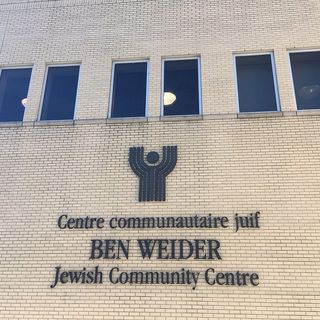 Every stop on the ALEPH / Jewish Renewal Listening Tour is different -- because every community we visit is unique. Every community has its own dynamics, its own history, its own needs and yearnings. And, of course, every stop on the ALEPH / Jewish Renewal Listening Tour is similar -- because there is always common ground among and between the places we go, because we bring the same questions with us everywhere we go, and because as different as we all are, we're all part of the same greater whole.
Every stop on the ALEPH / Jewish Renewal Listening Tour is different -- because every community we visit is unique. Every community has its own dynamics, its own history, its own needs and yearnings. And, of course, every stop on the ALEPH / Jewish Renewal Listening Tour is similar -- because there is always common ground among and between the places we go, because we bring the same questions with us everywhere we go, and because as different as we all are, we're all part of the same greater whole.
This past weekend I was blessed to travel, with Rabbi David Markus and Rabbi Evan Krame and ALEPH's executive director Shoshanna Schechter-Shaffin, for a Listening Tour Shabbaton in Montréal. Our gathering was co-sponsored by by B'nai Or Montreal Community Shul, Mile End Chavurah, and our colleagues at ALEPH Canada. Many of the participants came from the broad Montréal Jewish community. Others came from as far afield as Newfoundland, Ottawa, and Toronto.
Our weekend began with Shabbat dinner, graciously hosted by R' Sherril Gilbert, director of ALEPH Canada. We sat around the table with friends and family and members of the organizing committee. We blessed candles and wine and bread. We dined, and talked about Jewish Renewal, and after dinner we lingered at the table and sang songs of Shabbat, passing the guitar around the table, sharing favorite melodies and harmonies. This is one of my favorite ways to end any week. What a joy!
On Shabbat morning, we met at the Jewish Community Centre for davenen. This was a morning service with a large number of moving parts: a collaboration between clergy and lay leaders, between folks from B'nai Or and from Mile End and from Dorshei Emet (the local Reconstructionist shul), between locals and we who were visiting from afar.
I was honored with the privilege of leading shacharit, the part of the service containing the shema. Rabbi David and Rabbi Shalom Shachter collaborated on the Torah service (and I got to hear Rabbi David chant his bar mitzvah Torah portion, which was a delight). Rabbi Evan gave a stunning d'var Torah about Judaism "on the move," in which he made the case that Jewish Renewal is quintessentially a recognition of the fact that Judaism has always been evolving. I was particularly delighted when he connected the עשן, the smoke rising from our offerings of old, with an acronym for עולם, שנה, נפש / space, time, and soul.
After a lovely potluck lunch (during which I had the opportunity to meet soferet Jen Taylor Friedman, of whose work I have been a fan for many years) we moved into an open mike conversation. Rabbi David offered some framing remarks, noting that exactly 40 years ago this month Reb Zalman z"l came to Montréal for a Jewish Renewal Shabbaton! (Forty, of course, is a number with great spiritual significance in Judaism -- so this confluence felt especially sweet.) And then we entered into our spiritual practice of reflective listening.
Everywhere we go, it's our intention to take in what people have to offer -- hopes and fears, kvetches and joys, the one thing you never want us to change, the one thing you absolutely hope we will change, etc -- without reactivity, and without giving in to the temptation to offer our own response. The purpose of the listening tour isn't for y'all to hear from us: it's for us to hear from you. We heard some really valuable things about what members of this particular Jewish community value most about Jewish Renewal, about the unique challenges of life as a triple minority (Anglophone, Jewish, and Jewish Renewal), and about this community's hopes, dreams, and needs.
After the open mike, we settled in for a focus group conversation with Canadian Jewish community leaders. This too has become part of our practice everywhere we go. During the focus group we aim to shift to a meta-conversation about systemic questions, about how local or regional Jewish Renewal interfaces with the bigger picture of the renewal of Judaism, about networks and models of governance, and about the ecosystem of Jewish innovation and how we think all of these pieces do, or should, fit together.
On Sunday morning there was a more intimate conversation among leaders of ALEPH and ALEPH Canada. We talked about the internationalization of ALEPH, about the both common and uncommon challenges of the next generation finding (and, more importantly, helping to make) spiritual revitalization for itself, about the challenges of serving the scattered people of Canada. I was especially interested in our conversation about the dispersed who may feel disconnected from community -- whether in rural areas not unlike the one where I live, or in urban areas -- and who want and need an ALEPH that (re) connects them. (There was also a radio interview with Leslie Lutsky of Radio Centre Ville. Stay tuned, I'll post a link when that interview goes live.)
After a final meal in Montréal we regretfully bid adieu to the city -- and to Canada, though to the nation itself we were able to say à bientôt, since we'll be heading back across the border in a couple of weeks for our Listening Tour stop in Vancouver.
Many people have asked us how we're able to manage these intense Listening Tour weekends on top of our other obligations -- Rabbi David's congregation, my congregation, his fulltime job as a judicial official, my fulltime job as mother to a six year old. The answer is that while it's true that these weekends are exhausting, they are also incredibly renewing. It is a joy and a privilege to get to visit different Jewish Renewal communities: to see what's similar and what's different about how we daven, what's similar and what's different about our origin stories and our hopes for the future, what's common and what's unique about where we hope ALEPH and Jewish Renewal will take us in years to come.
Next on the ALEPH / Jewish Renewal Listening Tour: Vancouver over the weekend of March 26! If you're in or near Vancouver, join us at Or Shalom.

March 9, 2016
Stay
The instant you depart
I'm counting the days.
When I'm wholly with you
everything is sweeter.
A simple swallow of wine
reveals new flavors.
My soul is doubled
like manna in the desert.
My laugh lines deepen.
I am radiant as a bride.
If only I could stop time
and stay in your embrace.
Counting the days. In Hebrew, days of the week are named by their distance from Shabbat. (So Sunday is "First Day," and Monday is "Second Day," and so on, until Friday is "Sixth Day" -- the last day before Shabbat.) My soul is doubled. On Shabbat, says the tradition, we receive a neshama yeteirah, an additional soul. Like manna in the desert. We read in Torah that when the children of Israel were sustained by manna during their forty years' wandering, they collected twice as much manna on Fridays -- a double portion for Shabbat. (This is why today many follow the custom of having two challot on the Shabbat table.) I am radiant as a bride. Jewish mystics compared the Sabbath to a bride.
Shabbat shalom to all who celebrate.

Purim: a holiday of hiding and revealing
Because this year is a leap year on the Jewish calendar, we've had an extra month between Tu BiShvat and Purim... but Purim will be here soon, not long after the vernal equinox which marks the official first day of spring.
I used to think Purim was just a kids' holiday, an opportunity to dress up and make noise in shul. But even though I have a kindergartener who loves the schtick and silliness of Purim, I've come to savor Purim for the gifts it offers me as an adult. Each year, Purim teaches me again how to find divine presence in places and times which I might otherwise have mistakenly imagined to be devoid of God.
Here's a bit of wordplay which reflects some of what I'm talking about. Purim features a megillah (scroll) in which God is never explicitly megaleh (revealed). God's explicit presence is nistar (hidden) in this book -- as Esther (can you hear the connection between "Esther" and "nistar"?) hides her Jewishness when she enters the royal palace.
But Esther reveals her Jewishness when her people need her, and God's presence is woven throughout the story in the twists and turns of providence. Purim is a holiday of hiding and revealing. At Purim, God hides in plain sight.
I love the idea that God can hide in plain sight. Because if God can be hidden, than any place where (or time when) I feel as though God's presence is missing, it's possible I might be wrong about that. Our tradition contains this wisdom in a variety of places: not only implicitly in the Purim story, but explicitly in the Tikkunei Zohar, which teaches that there is no place devoid of the divine presence.
Here's what that means to me. No matter where we are, no matter what we're doing, God is with us. No matter what we are feeling -- even if what we are feeling is frustration, or loneliness, or grief -- God is with us. Even at times when life feels hopeless and we feel existentially alone, God is with us. Even when God's presence is neither visible nor palpable, God is with us.
I don't know what the word "God" means to you. I know that for some of us, that word is freighted, or opaque, or alienating. Fortunately our tradition offers us plenty of other words to try on. One of my favorites right now is the Hebrew word Havayah. It's a reshuffling of the letters yud-heh-vav-heh, the four-letter Name of God which is found in Torah and which is often understood as a permutation of the verb "to be." But Havayah can also be understood to mean "The Accompanier," or "The One Who Accompanies."
When I use the name Havayah, I'm reminding myself that I never need to feel alone. I'm reminding myself, as the Purim story reminds me, that even when God seems hidden, that doesn't mean there is no source of holiness in the world. Maybe what I'm experiencing is just a divine game of hide-and-seek. Maybe God hides in order that we might do the work of seeking. Maybe the seeking itself is what I really need to find... and I'm never truly doing it alone, because the One Who Accompanies is always with me.
These are intense theological musings to have been sparked by a scroll which is, on the surface, a bawdy soap opera about a long-ago Persian court! For me, that's precisely the point. Purim teaches me to seek (and find) depth, or meaning, or God, even in the unlikeliest of places. May you find wondrous things in unlikely places, this spring and always.
This originally appeared in the Berkshire Jewish Voice, in their Feb. 14 to April 2 issue.

March 8, 2016
On spiritual thirst
My latest post just went up at The Wisdom Daily. Here's a taste:
Sometimes in difficult circumstances, the safest thing to do is to shut down awareness of one’s emotional or spiritual thirst.
But like any other coping mechanism, this one can outlive its usefulness. Human beings can grow accustomed to almost anything. There is risk in allowing the practice of ignoring one’s thirst to become habitual. After a while, one might not even notice anymore that the thirst was ever there. And our emotional and spiritual thirsts are important. They come to tell us something about who we most deeply are.
Read the whole thing: An alternative to the life you lead.

March 7, 2016
Open
God is the doorman,
the one you don't notice
holding the heavy panel
so you can go through.
God is the hinge
that swings the door,
the joint and socket
that make opening possible.
God is the door
through which you walk
from one chapter
to the next,
adorned with words
that remind you
who you are becoming,
who you really are.
This week's Torah portion is Pekudei, which contains -- among other things -- descriptions of the making of the mishkan, the portable tabernacle which was intended as a place where God's presence could dwell. One of the parsha's recurring words is adanim, which is usually translated as sockets or hinges... but which comes from the same root as Adonai, one of our tradition's core names for God. That's what sparked this poem.
(For some beautiful wisdom on adanim and Adonai, don't miss this recent post from Rabbi Laura Duhan Kaplan: To infinity and beyond.)

March 1, 2016
The space between
 When you hear the word "cherub," what do you imagine?
When you hear the word "cherub," what do you imagine?
I looked the word up in a dictionary, and found the following: "having the childlike innocence or plump prettiness of a cherub." Maybe you've seen Renaissance paintings adorned with little pudgy winged smiling babies. Is that what a cherub is?
Not in Jewish tradition, it's not. The first mention of cherubs -- in Hebrew, כרבים / kruvim -- comes in the book of Genesis. When Adam and Chava are barred from the Garden of Eden, kruvim with flaming swords are stationed at the edge of the garden to keep the first humans from returning. The second mention of kruvim comes in the book of Exodus, in the description of the building of the mishkan, the portable sanctuary where God's presence could dwell.
As we read this morning, the craftsman Betzalel made the ark out of acacia wood, and covered it with gold. Atop its cover he made two golden kruvim, with their wings outspread, facing each other. In an earlier passage, God indicated that once the mishkan was built, God would speak to Moses from between the kruvim atop the cover of the ark.
Later, when the Temple was built in Jerusalem, it too would have a pair of kruvim. But descriptions of those Temple kruvim differ. In one place, we read that they faced each other, like the ones above the ark. In another place, we read that they faced the Temple itself. One could decide, faced with these conflicting descriptions, that the Tanakh just didn't have a very good editor! But the sages of the Talmud had another perspective. When the children of Israel followed God's will, they said, the kruvim faced each other lovingly. When the children of Israel disobeyed, the kruvim turned their backs on each other.
Torah teaches that God spoke from within the empty space between the two kruvim. And Talmud teaches that the kruvim faced each other when we followed the mitzvot, and turned away from each other when we did not. What happens when we bring those two teachings together?
When we follow the mitzvot -- loving one's neighbor, one's "other," as oneself; treating the earth with respect and letting her lie fallow as needed; acting with justice and mercy -- then the kruvim face each other, and God speaks from the place between them. They face each other when we face each other. I don't just mean facing each other in a spatial sense, but facing each other with heart and soul. This is what Martin Buber called I/Thou relationship. Borrowing from the language of yoga, one could say "the spark of God in me greets the spark of God in you." That's when God is present between us.
Martin Buber also spoke of I/It relationship. This is the opposite of I/Thou. Relating in an I/It way means treating each other as objects, rather than as holy beings created in the image and the likeness of the Holy One of Blessing. And when we do that, the kruvim turn their backs on each other. Maybe they turn around in sorrow. Maybe they turn around because they are imitating us: when we treat each other lovingly they gaze at each other in the same way, and when we are unkind and dismissive all they can do is follow suit. Regardless, when they turn their backs on each other, God's voice disappears.
Whether or not we hear the voice of God is up to us. Whether or not we receive continuing revelation is up to us. We can choose to act in ways which create the space within which that voice speaks, or we can choose to act in ways which will negate that possibility. The voice of the Infinite issued forth not from the golden statues themselves, not even from the holy text which was contained in the ark then and is contained in our scroll now, but from the dynamic space between the kruvim. God speaks to us from emptiness -- but not just any emptiness. God speaks from the spiritually charged space of relationship.
The mitzvot are a path toward imbuing our lives with meaning, and that's one of the prerequisites for hearing the voice of God. The other prerequisite is relationship. When we follow the mitzvot and relate in an I/Thou way, then God speaks from the space between the two kruvim, the space between you and me. This brings new meaning to the Jewish tradition of studying Torah in hevruta, with a study partner: not just because two minds are better than one, but because only when we resist the temptation to "go it alone" can new Torah be revealed. The only way to hear the voice of God is to listen, lovingly, together.
Image: one rendering of what the ark of the covenant might have looked like, topped with golden keruvim.
This is the d'var Torah I offered at my shul yesterday morning. It draws substantially on"Kruvim in the Canon: Angelic Paradigm Shift" by Rabbi David Evan Markus.

Rachel Barenblat's Blog
- Rachel Barenblat's profile
- 6 followers


